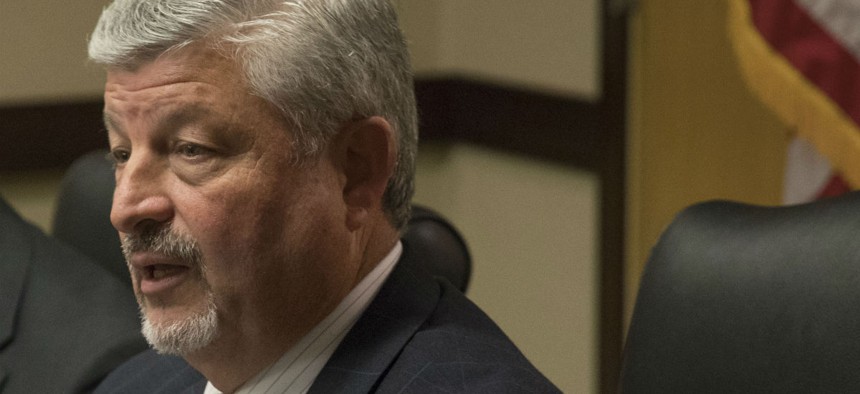
NTEU President Tony Reardon said Congress must stop using federal employees as a punching bag. Jim Tourtellotte/CBP
Federal Employee Union Preps for Year of Benefits Battles
NTEU members lobby lawmakers amid shutdown threat and ahead of budget launch.
More than 350 members of the National Treasury Employees Union descended onto Capitol Hill Wednesday to lobby members of Congress to advocate protecting federal workers’ pay, benefits and due process protections.
The federal employee union’s annual legislative conference came amid negotiations for what will be Congress’ fifth short-term spending measure since October, and on the eve of the White House’s unveiling of its fiscal 2019 budget proposal, slated for next week.
In a speech to members, NTEU National President Tony Reardon said the era of using the federal workforce as a congressional punching bag must end.
“We are demanding that the attacks on federal employees stop,” he said. “Members of Congress are going after your pay, your pensions and your retirement. Some want to defund your agencies, remove scientific expertise, or simply abolish your mission altogether.”
He highlighted the victories labor groups claimed last year, primarily in the form of preventing Republican proposals to cut employee retirement programs from being enacted. But he warned that in the coming weeks, many of those same proposals, like increasing employees’ contribution to the Federal Employee Retirement System and removing the FERS supplement for retirees under the age of 62, would likely return to the fore along with a proposed pay freeze for feds in 2019.
“This is not the promise that was made to you when you entered the federal service,” he said. “[Proponents] claim this will move compensation closer to the private sector, but I think that is disingenuous and dangerous . . . Instead of engaging in a race to the bottom, the federal government should be a leader in employment issues.”
Reardon also pushed back on comments made by President Trump during the State of the Union address last week, in which Trump said Congress should make it easier to fire feds who “fail the American people.”
“[Trump] seemed to be under the incorrect impression that managers cannot reward high performing employees or dismiss poor performers,” he said. “Any rollback to federal employees’ due process rights would not just be bad for you, but would be a setback for our nation.”
In a meeting with reporters, Reardon expanded on those comments, arguing that instead of eroding protections for federal workers, the government should do a better job of training managers on how to properly document employees’ performance.
“The General Schedule has built-in provisions to reward good performers, and to punish poor ones,” he said. “Managers now are either not using those provisions, or they haven’t been trained in how to use the tools available to them.”
Union officials spoke just hours before Senate leaders announced that they had reached a broad two-year deal to increase budget caps by more than $300 billion, extend funding for a number of key priorities, and to increase the debt ceiling. But they said the near-constant threat of government shutdowns since the beginning of the fiscal year last October takes a toll on members. Even with a deal struck on overall spending levels, Congress will need to pass another six-week CR to give lawmakers time to craft an omnibus measure to appropriate funds through September.
“This is no way to run a government,” Reardon said. “Agencies need stable, long-term funding in order to plan and execute projects, and employees don’t deserve to be pawns in these negotiations.”
And NTEU Director of Legislation Jill Crissman said that no matter the state of negotiations, employees get skittish as a deadline nears.
“Any time you get within 48 hours of a deadline like this, that becomes concerning,” she said. “Feds know a lot of spending decisions have to be made, and they’re just eager for lawmakers to do that.”







